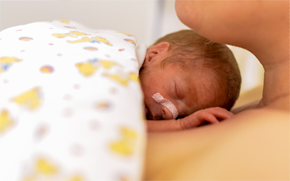June 01, 2017 | Press Release
Mother´s age doesn´t matter
A mother's advanced age at childbirth is not the reason for the elevated risks of low birth weight or preterm birth, but may instead be related to individual circumstances and behavioral patterns of the mother.

Delicate baby cuddling up to its mother. The risk of preterm birth or having a baby with low birth weight does not increase with the mother´s age per se, a new MPIDR study shows. © Tobilander / Fotolia.de
A number of previous scientific studies have found that among mothers 35 or older, there is an elevated risk that their children are born preterm (less than 37 weeks of pregnancy) or with low birth weight (less than 2.5 kilograms).
Low birth weight children have more respiratory, cognitive and neurological problems than those born with normal weight. Preterm babies have elevated risks of heart defects, lung disorders, brain damage, and delayed development. The mean age of women at childbearing has been rising for the last decades in high income countries making these risks highly relevant.
However, advanced maternal age per se does not seem to be causing the increase in birth risks. This is the finding of a new study that has just been published in the American Journal of Epidemiology which was conducted by Mikko Myrskylä, director of the Max Planck Institute for Demographic Research (MPIDR) and Alice Goisis from the London School of Economics.
The researchers looked at thousands of Finnish families where at least two children were born to the same mother between 1987 and 2000. They found that within the same family the advancing age of the mother did not increase the risk of poor birth outcomes.
In contrast, when they compared children born to different mothers at different ages, risks went up notably with the age of the mother. For example, the probability of a low weight birth for a mother age 40 and above is twice as high (4.4 percent) as compared to a woman between 25 and 29 (2.2 percent).
Thus, on the whole, preterm deliveries or low birth weights still occur more often when the mother is older. "A doctor who only knows the age of a pregnant woman can still use her age to predict the birth risk," says Mikko Myrskylä.
For the individual mother age is not critical
"However, for the individual mother age is not the real cause of the increase in birth risks," explains Alice Goisis. “The true reasons are more likely to be individual circumstances in the life of the parents or behaviors that are more common in older adults.”
The new study did not focus on these true reasons. Searching for them would require a different method and even more detailed data than is available from the Finnish registers that the scientists used for this study.
Potential candidates for these individual risk factors could be fertility problems, which are associated both with the risk of poor birth outcomes and with an older maternal age at birth, the level of maternal stress, and unhealthy behaviors, say the authors.
By looking at children born to the same mother, the researchers could isolate the effect of pure age on the risk of poor birth outcomes. Most other potentially influencing factors could be excluded by this type of analysis, because while they vary between different families, they don’t vary between pregnancies of any individual woman.
Factors that do change from one birth to the next for the same mother–such as family income and birth order–could be excluded as reasons for elevated risks by controlling for them statistically.
In effect, when only the age of the mother changed in the statistical calculations, the increase in birth risks disappeared.
"Our findings suggest that women should not be concerned about their age per se, when considering to have a child," says demographer Myrskylä. "It seems that individual life circumstances and behavioral choices are more important than age."
About the MPIDR
The Max Planck Institute for Demographic Research (MPIDR) in Rostock investigates the structure and dynamics of populations. The Institute’s researchers explore issues of political relevance, such as demographic change, aging, fertility, and the redistribution of work over the life course, as well as digitization and the use of new data sources for the estimation of migration flows. The MPIDR is one of the largest demographic research bodies in Europe and is a worldwide leader in the study of populations. The Institute is part of the Max Planck Society, the internationally renowned German research organization.
Associated Information for Download
This press release (PDF File, 157 kB)
Original publication
Goisis, A., H. Remes, K. Barclay, P. Martikainen and M. Myrskylä: Advanced maternal age is not an independent risk factor for low birth weight or preterm birth. American Journal of Epidemiology [First published online: 01 June 2017]. DOI:10.1093/aje/kwx177
(online version initially as unedited manuscript, accepted by the journal)
Contact
Press and Public Relations